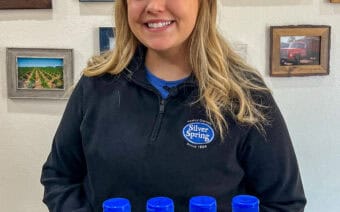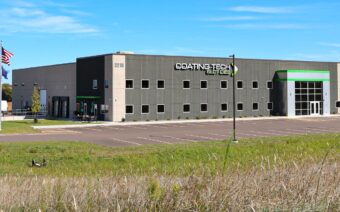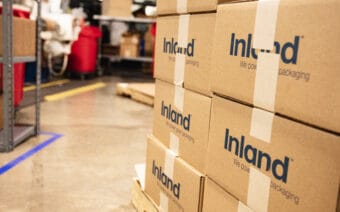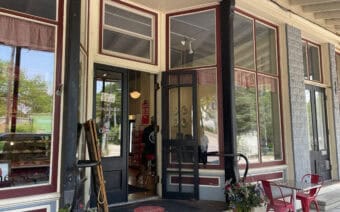
March 18, 2024
WEST SALEM – Perhaps it’s fitting for a company specializing in micro information to be based in a small town.
Still, few would guess America’s only manufacturer of book-scanning machines to use line CCD (charge-coupled device) technology – Indus International, Inc. – would be located in West Salem, Wisconsin, rather than a metropolis.
“There are opinions about that,” Ameen Ayoob, president of Indus International, said. “Maybe it is better to be in a place like Boston or Minneapolis or Chicago. Everything is good here, though. Why move?”
With the boom of the internet, Ayoob said there is no need to be in a bigger city.
“When people are coming to us through the internet to ask us about our products, it doesn’t matter if I am here or in some big city somewhere else,” he said.
Regardless, Ayoob said, Indus’ book scanners are being sought by some prominent customers – including universities such as Cornell, Villanova, Marquette and Des Moines, all of which purchased scanners from Indus.
Museums including The British Museum in London, as well as public and state libraries in Texas, South Dakota and North Carolina, Ayoob said, have purchased Indus book scanners as well, to be “used by sophisticated users for archival purposes.”
Elsewhere, he said, Indus International has supplied, installed and serviced robotic scanners – machines programmed to automatically turn a book’s pages – for the Library of Congress and the U.S. Department of Homeland Security.
Ayoob said he’s proud of Indus’ reputable customer base but is pleased with his company’s ability to evolve with changing technologies and market needs.
Scanning through history
As Indus International enters its 39th year of operation, Ayoob said his tenure at 340 South Oak St. predates Indus itself.
When he moved to West Salem from Toronto in 1978, he said the building was a hub of an American corporation specializing in micro information viewing machines.
“This plant was manufacturing microfilm and microfiche equipment, which is used today mainly by libraries, but in those days, it was used by financial companies, insurance companies – anyone who had data before computers became common,” he said. “For example, if you wanted to buy parts for your appliance, you went to your store and for parts, they would look up the parts manual or catalog all on microfiche.”
Ayoob said he was the company’s plant manager when he was informed the operation would be shutting down.
He said he decided to purchase the assets and retain the workforce, and in 1985, Indus International was born.
When it came to naming his new company, Ayoob said he noted how many area businesses had names referencing the nearby Mississippi River.
This, he said, inspired him to honor the prominent, civilization-significant waterway from his native Pakistan, the Indus River.
In the years following, Ayoob said the micro information industry naturally pivoted toward a new format: digital.
“Since PCs became networked, the microfiche business died,” he said. “All that information used to go on microfiche, but now it (is stored and transferred) via the internet or networks.”
Ayoob said Indus was able to foresee this imminent change, recognizing its days of shipping microfilm viewers by the hundreds and thousands were coming to an end.
Though the company still does some business regarding microfilm and microfiche equipment, he said Indus knew they needed to embrace the new development.
“We started looking into other things,” he said. “We developed software for document management – in other words, software that will replace your manual filing cabinet.”
Ayoob said Indus still offers that product, too, but has needed to continually innovate to stay relevant amid ever-evolving changes to the micro information and data industries.
In the 1990s, Ayoob said he became aware of early efforts to digitize books – a niche relevant to Indus since the company had already pivoted to digital file management.
“In 1998, 1999 is when we started to see people making crude productions – people who were doing videos and taking pictures of books using (regular) cameras,” he said.
As book-scanning technology advanced, Ayoob said he saw Indus’ opportunity to compete in this burgeoning industry.
By 2009, he said, the company had immersed itself as a lead supplier of book scanners.
The following year, Ayoob said Indus began work on its own book scanner model compatible with the company’s proprietary document storage software.
“We developed and started manufacturing in 2010, and 2011 was the first release of our BookScanner 9000,” he said. “We have been manufacturing that model to date, and then in 2019, we added a larger-format scanner, which is our BookScanner 5005MAX.”
The two models employ the line CCD technology that Ayoob said sets Indus apart from the rest of the U.S. book-scanning market.”
The larger-format model, Ayoob said, was developed to offer size capabilities unmatched internationally.
“We found out there are certain sizes of books in the U.S. that don’t easily fit in the German scanners or European scanners,” he said.
Ayoob said this is particularly useful within the U.S. for digitizing American counties’ registers of deeds, which are 18 inches long and 28 inches wide when open.
The 5005MAX, despite its larger scans, he said, is also exceptionally fast as it uses two CCDs to scan.
Ayoob said it is an honor for Indus machines to be trusted with preserving documents, particularly of historical significance.
He said he recently appreciated this when Indus installed one of its scanners at the Nashville Public Library, which he said is home to records from America’s earliest days.
“When one of our (technicians) went to do the installation he saw those books – they were being scanned in our scanner and they are historical,” he said. “There were interesting things in them we looked at and said, ‘my god, this is going back years.’”
Hometown pride
Ayoob said Indus sends technicians to install every machine it sells and also offers on-site support throughout the continental U.S.
“We go to the customer’s site, but because we have been making products that don’t have too much downtime… even if (customers) don’t need us for any problems, we try to make one visit a year, and then yes, if something is broken down, we go to fix it,” he said.
Indus technicians, Ayoob said, have installed book-scanning machines all across the U.S., as well as in Jordan, Egypt, Ethiopia, England, China and, very soon, Canada.
Though Indus’ efforts focus on special library collections and preserving out-of-print newspapers, tabloids and records from all across the world, Ayoob said his focus and appreciation lie in production in present-day West Salem.
“We have metal manufacturing capabilities right in our business, right in our factory,” he said. “We cut the metal, we bend the metal, we weld the boxes or fabricated product, we paint and bake the paint and then assemble it in our assembly area,” he said. “And then my employees are all local. They’ve always been local employees.”
As unlikely as West Salem may be for his book-scanning business, Ayoob said, there is nowhere he’d rather be.
“It makes us feel proud,” he said.
For more information, visit IndusUSA.com.
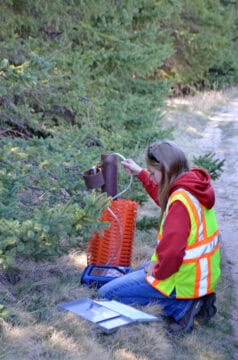 Ayres engineers 50 years in Green Bay
Ayres engineers 50 years in Green Bay Letting the sun do the work
Letting the sun do the work


